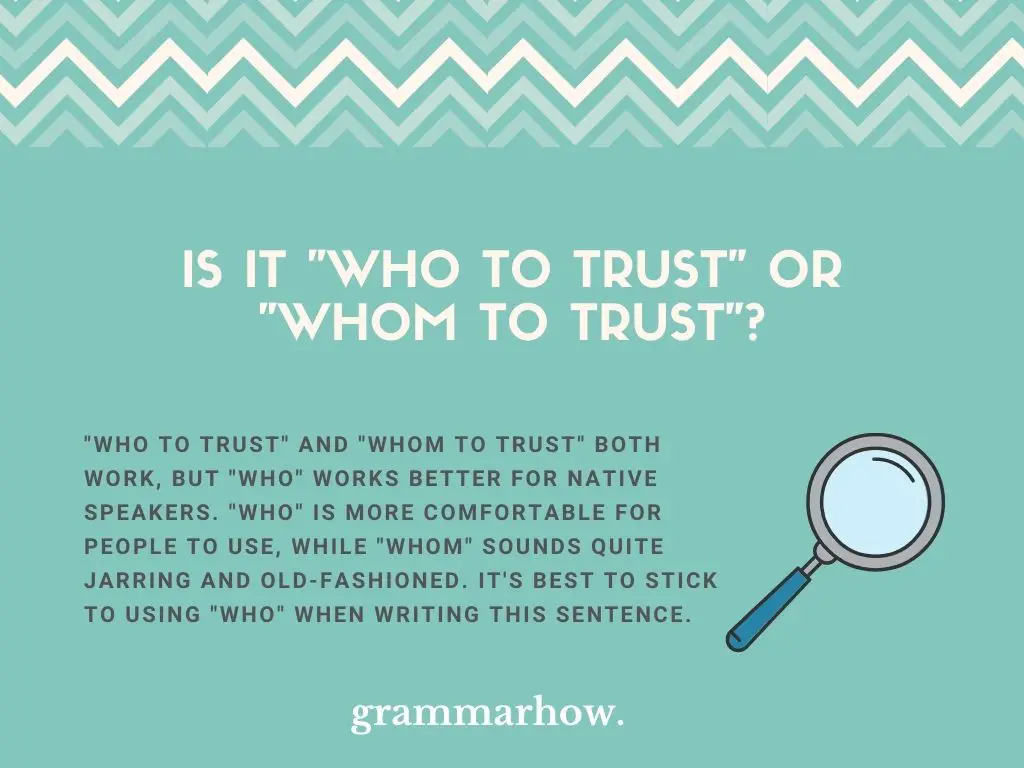It’s time to learn about “who” and “whom.” They are very similar words (both coming from the same root word), but they are used in different contexts. This article will explain the differences between “who to trust” and “whom to trust.”
Is It “Who to Trust” or “Whom to Trust”?
“Who to trust” and “whom to trust” both work, but “who” works better for native speakers. “Who” is more comfortable for people to use, while “whom” sounds quite jarring and old-fashioned. It’s best to stick to using “who” when writing this sentence.

You can use them both interchangeably, but we wouldn’t encourage that. Most people think “whom” is the more formal of the two. While this is true, there are also plenty of cases where native speakers use “who” formally as well (since it sounds better in most sentences).
“Whom” is the object of the sentence, which is why it makes more grammatical sense. The subject would have come before the phrase “who to trust” (i.e. “I don’t know who to trust).
However, “who” also works as the object of the sentence. As English evolves, words can take on different or extra meanings. “Who” has started to outshine “whom” because it can be used as both a subject and an object.
If in doubt, you should always use “who.” It’s the word that’s less likely to get funny looks from native speakers!
According to Google Ngram Viewer, “who to trust” is by far the most popular choice, and it only continues to grow. There was a time when “whom to trust” was more popular, but this hasn’t been the case for quite a few decades now.

Who to Trust
“Who to trust” works well in today’s world. Many people use “who” in place of “whom” even though it technically doesn’t follow the correct rules. “Who” just feels more natural to native speakers, making it the most suitable choice whenever you’re writing it.
- I’m not sure who to trust anymore. I thought I had it figured out, but I was clearly in the wrong.
- Can you tell me who to trust? I want to make sure I make the best-informed decision that I can.
- I won’t share with you who to trust. I don’t think it’s particularly important for you to know that.
- I don’t know who to trust. Can you please give me a little more guidance on this?
Whom to Trust
“Whom to trust” is the original way that this sentence was worded. We use “whom” because it’s the object of the sentence. There will usually be a subject before it (i.e. “I don’t know whom to trust”), which is why the object should work better.
Most people avoid using “whom” because it sounds too jarring. Native speakers always prefer “who.”
- I won’t tell you whom to trust. I think it would be best if you try to figure that out on your own.
- I’m not sure whom to trust anymore. I thought you wouldn’t lie to me, but I was clearly mistaken.
- Will you please tell me whom to trust? I can’t buy into a single thing any of them are talking about.
- I won’t let you know whom to trust. Trust me; you’ll be better off if you work this one out.
Which to Trust
“Which to trust” is slightly different. The idea of “to trust” stays the same, but “which” is the object pronoun here. This time, we use “which” because it refers to items and objects. “Who” and “whom” only refer to people, so “which” offers more variety.
- I don’t know which to trust, so I’ll have to keep going until I figure it out.
- I’m not sure which to trust more. Both results look good, but I’m sure there are better ways for us to tackle this.
- I think I know which to trust more from what I’ve seen, but I could be completely wrong about that.
- I know which to trust more, but have you figured it out? I bet you don’t even know what’s going on right now!
Is It “Who I Trust” or “Whom I Trust”?
“Who I trust” and “whom I trust” are both correct. “Who” works best in most situations because it’s more common for native speakers to lean toward “who.” “Whom” is the old-fashioned variation, which sees little to no usage today outside of the most formal situations.
Adding a pronoun like “I” instead of the preposition “to” does not change the overall impact of “who” or “whom” on the sentence.
- I don’t know who I trust with this information.
- Sarah, whom I trust with my full heart, is going to be arriving later.
Also, writing the sentence as a question is possible, where questioning words like “can” are added. Even in these cases, it’s more likely that “who” is used over “whom” (even though “whom” technically has the more “correct” rules associated with object pronouns in a sentence).
- Who can I trust with this information?
- Whom can I trust with this information?
Final Thoughts
While both “who to trust” and “whom to trust” are correct, it’s clear that “who to trust” will yield more positive results. You’ll find that most native speakers prefer this phrase, so it’s the one you should focus your attention on learning when it comes to it.
You may also like:
Is It “Whom Does It Belong To” or “Who Does It Belong To”?
Is It “Who Are You Looking For” or “Whom Are You Looking For”?
“Who Do You Want” or “Whom Do You Want”? (Correct Version)

Martin holds a Master’s degree in Finance and International Business. He has six years of experience in professional communication with clients, executives, and colleagues. Furthermore, he has teaching experience from Aarhus University. Martin has been featured as an expert in communication and teaching on Forbes and Shopify. Read more about Martin here.
